Related Research Articles

Ibrahim Ahmed Mahmoud al Qosi is a Sudanese citizen and paymaster for al-Qaeda. Qosi was held since January 2002 in extrajudicial detention in the United States Guantanamo Bay detainment camps, in Cuba. His Guantanamo Internment Serial Number is 54.
Hamdi v. Rumsfeld, 542 U.S. 507 (2004), is a United States Supreme Court case in which the Court recognized the power of the U.S. government to detain enemy combatants, including U.S. citizens, but ruled that detainees who are U.S. citizens must have the rights of due process, and the ability to challenge their enemy combatant status before an impartial authority.
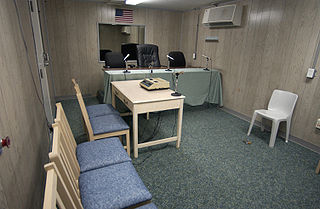
The Combatant Status Review Tribunals (CSRT) were a set of tribunals for confirming whether detainees held by the United States at the Guantanamo Bay detention camp had been correctly designated as "enemy combatants". The CSRTs were established July 7, 2004 by order of U.S. Deputy Secretary of Defense Paul Wolfowitz after U.S. Supreme Court rulings in Hamdi v. Rumsfeld and Rasul v. Bush and were coordinated through the Office for the Administrative Review of the Detention of Enemy Combatants.

Salim Ahmed Hamdan is a Yemeni man, captured during the invasion of Afghanistan, declared by the United States government to be an illegal enemy combatant and held as a detainee at Guantanamo Bay from 2002 to November 2008. He admits to being Osama bin Laden's personal driver and said he needed the money.

Musab Omar Ali al Madoonee is a citizen of Yemen who was held in extrajudicial detention in the United States Guantanamo Bay detainment camps, in Cuba.
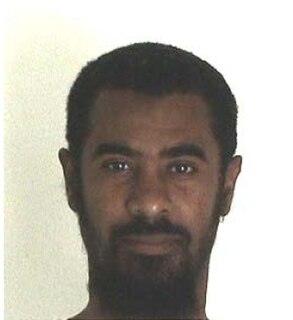
Sulaiman Awath Sulaiman Bin Ageel Al Nahdi is a citizen of Yemen, who held in extrajudicial detention in the United States Guantanamo Bay detainment camps, in Cuba, from May 5, 2002, until November 16, 2015. Al Nahdi's Guantanamo Internment Serial Number is 511. The Department of Defense reports that al Nahdi was born on December 1, 1974, in Mukalla, Yemen.
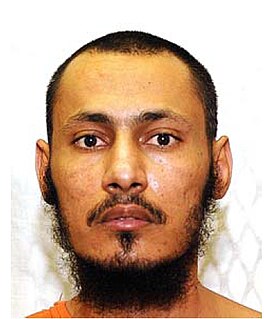
Mohammed Ali Abdullah Bwazir is a citizen of Yemen, once held in extrajudicial detention in the United States Guantanamo Bay detainment camps, in Cuba. Bwazir's Guantanamo Internment Serial Number was 440. American intelligence analysts estimate he was born in 1980, in Howra, Yemen.

Muhammad Ahmad Abdallah Al Ansi is a citizen of Yemen, held in extrajudicial detention in the United States Guantanamo Bay detention camps, in Cuba. Al Ansi's Guantanamo Internee Security Number is 029. American intelligence analysts estimate that Al Ansi was born in 1975, in Sanaa, Yemen.

Ridah Bin Saleh Al Yazidi is a citizen of Tunisia held in extrajudicial detention in the United States Guantanamo Bay detainment camps, in Cuba since the day it opened, on January 11, 2002. Al Yazidi's Guantanamo detainee ID number 38. The Department of Defense reports that he was born on January 24, 1965, in Unfidel, Tunisia.
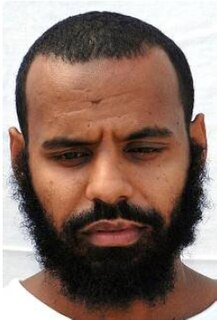
Salem Ahmed Hadi is a citizen of Yemen, who was held in extrajudicial detention in the United States Guantanamo Bay detainment camps, in Cuba. His detainee ID number is 131. Joint Task Force Guantanamo counter-terrorism analysts reports that Hadi was born on January 15, 1976, in Hadramaut, Yemen.
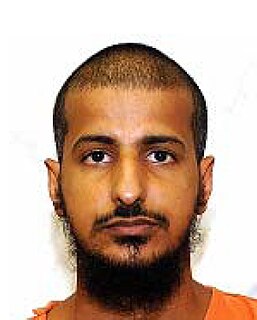
Tarek Ali Abdullah Ahmed Baada is a citizen of Yemen, held in extrajudicial detention in the United States Guantanamo Bay detainment camps, in Cuba. His detainee ID number is 178. Joint Task Force Guantanamo counter-terrorism analysts estimate that Baada was born in 1976, in Shebwa, Yemen.

Zahar Omar Hamis Bin Hamdoun is a citizen of Yemen, held in extrajudicial detention in the United States Guantanamo Bay detainment camps, in Cuba. His Guantanamo Internment Serial Number is 576. The Department of Defense reports that he was born on November 13, 1979, in Ash Shihr, Yemen.
Boumediene v. Bush, 553 U.S. 723 (2008), was a writ of habeas corpus submission made in a civilian court of the United States on behalf of Lakhdar Boumediene, a naturalized citizen of Bosnia and Herzegovina, held in military detention by the United States at the Guantanamo Bay detention camps in Cuba. Guantanamo Bay is not formally part of the United States, and under the terms of the 1903 lease between the United States and Cuba, Cuba retained ultimate sovereignty over the territory, while the United States exercises complete jurisdiction and control. The case was consolidated with habeas petition Al Odah v. United States. It challenged the legality of Boumediene's detention at the United States Naval Station military base in Guantanamo Bay, Cuba as well as the constitutionality of the Military Commissions Act of 2006. Oral arguments on the combined cases were heard by the Supreme Court on December 5, 2007.
Al Odah v. United States is a court case filed by the Center for Constitutional Rights and co-counsels challenging the legality of the continued detention as enemy combatants of Guantanamo detainees. It was consolidated with Boumediene v. Bush (2008), which is the lead name of the decision.
The nature of international human rights law has been seemingly altered by Americans since the attacks on New York City and Washington, D.C. on September 11, 2001. The Guantanamo Bay detention camp is one example of recent developments that seem to disregard long standing human rights. The United States of America (USA) has pursued a 'seemingly deliberate strategy' to put suspected terrorists outside the reach of habeas corpus protections. Naval Station Guantanamo Bay serves as the location for a United States military prison in Cuba designed for the detention of non-citizens suspected of terrorist activity. At the time of its creation President Bush stated that its purpose was to respond to serious war crimes, primarily 'a new way to deal with terrorists'. The first camp was set up 3 months after the attacks on the twin towers and since then a human rights debate has begun over the legality of denying detainees the right to petition habeas corpus.
İbrahim Şen is a citizen of Turkey who was held in extrajudicial detention in the United States's Guantanamo Bay detention camps, in Cuba. His Guantanamo Internment Serial Number was 297. The Defense Intelligence Agency reports that following İbrahim Şen's repatriation he "returned to terrorism".
Al Joudi v. Bush (Civil Action No. 05-cv-301) is a writ of habeas corpus filed on behalf of several Guantanamo detainees, including: Majid Abdulla Al Joudi, Yousif Mohammad Mubarak Al-Shehri, Abdulla Mohammad Al Ghanmi and Abdul-Hakim Abdul-Rahman Al-Moosa, before US District Court Judge Gladys Kessler. It was one of over 200 habeas corpus petitions filed on behalf of detainees held in the Guantanamo Bay detention camp in Cuba.
Zalita v. Bush is a writ of habeas corpus filed on behalf of Guantanamo captive Abu Abdul Rauf Zalita before United States District Court judge Ricardo M. Urbina. On January 2, 2008 the Project to Enforce the Geneva Conventions named Zalita v. Bush on a list of "notable GTMO and related cases".
Sufyian Barhoumi is a citizen of Algeria, who is currently held in extrajudicial detention in the United States Guantanamo Bay detention camps, in Cuba. The Department of Defense reports that he was born on July 28, 1973, in Algiers, Algeria.
Wali Mohammed is a citizen of Afghanistan who was held in extrajudicial detention, for over fourteen and a half years, in the United States Guantanamo Bay detention camps, in Cuba.
References
- ↑ "Celikgogus v. Rumsfeld". Center for Constitutional Rights. Archived from the original on 2008-07-31. Retrieved 2008-05-25.CS1 maint: bot: original URL status unknown (link)
- ↑ "Fact Sheet: Former GTMO Detainee Terrorism Trends" (PDF). Defense Intelligence Agency. 2008-06-13. Archived from the original on 2008-07-09. Retrieved 2008-07-26.CS1 maint: bot: original URL status unknown (link)
- 1 2 "Detainees Found to No Longer Meet the Definition of "Enemy Combatant" during Combatant Status Review Tribunals Held at Guantanamo" (PDF). United States Department of Defense. November 19, 2007. Retrieved 2008-04-15.